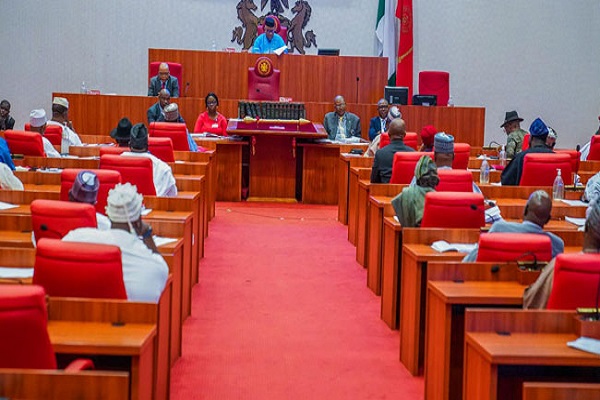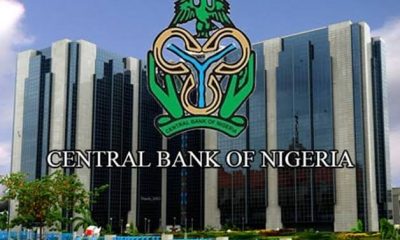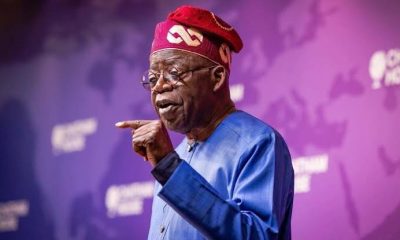News
Bank Recapitalisation: Presidency Backs CBN, Investors Rush For Mega-Banks Stock

Presidency on Tuesday expressed support for the banking sector consolidation initiative of the Central Bank of Nigeria, saying it would help the country to grow the economy to a new height.
This came barely five days after the CBN said it would ask banks to raise new capital.
According to the Presidency, it has become important to consider the capital adequacy of Nigerian banks in light of the projected $1tn economy in eight years.
Representing President Bola Tinubu at the 40th Anniversary Celebration of The Guardian Newspapers in Lagos on Tuesday, the President’s Special Adviser on Information and Strategy, Bayo Onanuga, said there would be a strong need to revisit the capital adequacy levels of banks
Onanuga said, “On the economy, that is facing all of us, our ambition to attain the $1tn appears daunting but we believe that it is achievable with God on our side and our collective determine. This explains the reason the VP and I have been on the road trying to attract huge investments into various phases of our economy; agriculture, oil and gas and others.
“To arrive at the $1tn economy, we must address the capital adequacy of our banks that will prepare the fuel for this journey.”
At the 58th annual Bankers’ Dinner last Friday, CBN Governor, Olayemi Cardoso, had said a stress test performed on Nigerian banks revealed that while they would withstand mild to moderate stress, they would be unable to service a $1tn economy projected by Tinubu in seven years, hence the need for recapitalisation.
Cardoso said, “Stress tests conducted on the banking industry also indicate its strength under mild-to-moderate scenarios of sustained economic and financial stress, although there is room for further strengthening and enhancing resilience to shocks. Therefore, there is still much work to be done in fortifying the industry for future challenges.”
He added, “Considering the policy imperatives and the projected economic growth, it is crucial for us to evaluate the adequacy of our banking industry to serve the envisioned larger economy. It is crucial to evaluate the adequacy of our banking industry to serve the envisioned larger economy. It is not just about its current stability. We need to ask ourselves, can Nigerian banks have sufficient capital relative to the finance system needs in servicing a $1tn economy shortly, in my opinion, the answer is no, unless we take action. As a first test, the central bank will be directing banks to increase their capital.”
Mega bank stocks
Meanwhile, PUNCH findings show investors have begun positioning themselves in the stocks of Tier-1 banks listed on the Nigerian Exchange Limited following the announcement of the proposed recapitalisation of the banks.
There are reports some big banks may be eyeing smaller and weaker ones in the event the proposed consolidation in the sector fuels possible acquisitions.
Meanwhile, findings showed that some listed financial institutions gained over N101.18bn on Monday and Tuesday, following the announcement of the proposed banking sector recapitalisation.
An analysis done by The PUNCH at the close of trading on Tuesday revealed that at least six of the lenders added to their market capitalisation in the two trading sessions this week, while five banks shed their value and two remained unchanged.
The lenders who gained included United Bank for Africa Plc, whose market capitalisation rose to N731.87bn on Tuesday from N713.06bn on Friday, the market cap of Zenith Bank Plc appreciated by one per cent to N1.10tn and Access Holdings Plc’s market cap rose by four per cent to close Tuesday’s trading at N639.81bn.
FBN Holdings Plc has been the biggest gainer so far as its market cap stood at N800.47bn on Tuesday from N717.91bn on Friday, marking an 11 per cent appreciation. The market cap of Sterling Financial Holdings Plc rose by 4.51 per cent to N106.81bn and the value of FCMB Group’s share rose by one per cent to N137.63bn.
The five lenders who lost during the period under review include; Guaranty Trust Holding Company (-1 per cent), Jaiz Bank (-2 per cent), Unity Bank (-8.69 per cent), Wema Bank and Stanbic IBTC Holdings (-3.08 per cent) to close with their market capitalisation at N1.13tn, N55.27bn, N19.64bn, N66.61bn and N816.29bn respectively.
The market capitalisation of two lenders, Ecobank Transnational Incorporated Plc and Fidelity Bank remained unchanged over the two-day period at N293.59bn and N288.11bn respectively.
A bank CEO, who earlier spoke to The PUNCH, welcomed the CBN policy direction regarding the recapitalisation of the banks, saying his institution was ready to raise fresh capital though it had yet to conclude the modality.
“Even before the CBN governor made the pronouncement, our bank was already considering raising fresh capital to significantly increase the capital base. This should happen in the first quarter of 2024. So, we are in tune with the CBN governor,” the CEO of a Tier-1 lender told one of our correspondents on Saturday.
In the last few months, First Bank of Nigeria Holdings, Wema Bank and Jaiz Bank have proposed Rights Issues, while Fidelity Bank has announced plans to raise additional capital via the issuance of 13,200 billion ordinary shares via public offer and rights issue. It was gathered that Wema Bank would commence its Rights Issue on December 1.
Headline
Prince Harry visits sick Nigerian soldiers in Kaduna

Prince Harry and his team visited the 44 Nigerian Army Reference Hospital in Kaduna to interact with wounded soldiers who are receiving treatment.
The Duke of Sussex is in Nigeria with his wife to champion the Invictus Games, which Harry founded to aid the rehabilitation of wounded and sick servicemembers and veterans.
Nigeria joined the Invictus Community of Nations in 2022 becoming the first African country to join.
Prince Harry’s visit to Kaduna came 68 years after his late grandmother Queen Elizabeth II visited the state during the time of the late Premier of Northern Region Sir Ahmadu Bello.




News
Senate approves death penalty for drug traffickers

Senate on Thursday, May 9, approved the death penalty for those convicted on the charge of drug trafficking in the country.
The punishment prescribed in the extant NDLEA Act is a maximum sentence of life imprisonment.
The resolution of the Senate followed its consideration of a report of the Committees on Judiciary, Human Rights and Legal Matters and Drugs and Narcotics, National Drug Law Enforcement Agency (NDLEA) Act (Amendment) Bill, 2024.
The Chairman of the Committee on Judiciary, Human Rights & Legal Matters presented the report during plenary, Senator Mohammed Monguno (APC-Borno North).
The bill, which passed its third reading, aims to update the list of dangerous drugs, strengthen the operations of the NDLEA, review penalties, and empower the establishment of laboratories.
Section 11 of the current act prescribes that “any person who, without lawful authority; imports, manufactures, produces, processes, plants or grows the drugs popularly known as cocaine, LSD, heroin or any other similar drugs shall be guilty of an offence and liable on conviction to be sentenced to imprisonment for life” was amended to reflect a stiffer penalty of death.
Although the report did not recommend a death penalty for the offence, during consideration, Senator Ali Ndume moved that the life sentence should be upgraded to the death penalty.
During a clause-by-clause consideration of the Bill, Deputy Senate President Barau Jibrin, who presided over the session, put the amendment on the death penalty to a voice vote and ruled that the “ayes” had it.
But Senator Adams Oshiomhole objected to the ruling, saying that the “nays” had it.
He argued that matters of life and death should not be treated hurriedly, but Barau said it was too late, as he failed to call for division immediately after his ruling.
The bill was subsequently read for the third time and passed by the Senate.
-

 Headline5 days ago
Headline5 days agoSuspend cybersecurity levy– Reps to CBN
-

 Business5 days ago
Business5 days agoNigeria needs over $2bn to revive Ajaokuta Steel Plant, says Minister
-

 Entertainment3 days ago
Entertainment3 days agoAMVCA Cultural Day: BBNaija’s Neo, Venita win Best Dressed Male, Female
-

 Headline3 days ago
Headline3 days agoPrince Harry visits sick Nigerian soldiers in Kaduna
-

 News5 days ago
News5 days agoShan George’s money returned to Zenith Bank account
-

 Metro3 days ago
Metro3 days agoEx-Sports Minister laments after hospital neglected him for hours over N80000 deposit
-

 Headline5 days ago
Headline5 days agoTinubu resumes work after foreign trip











